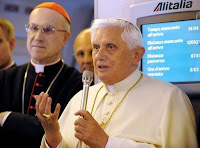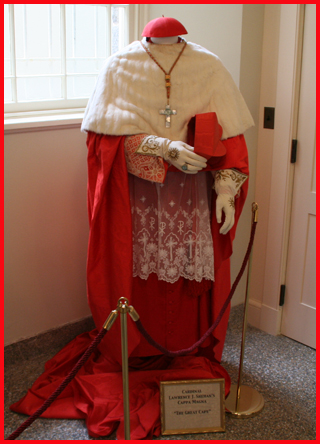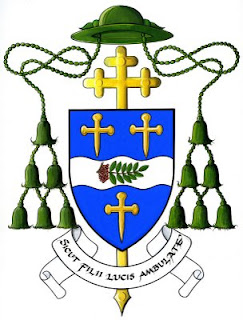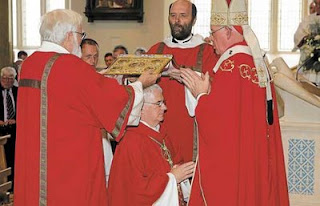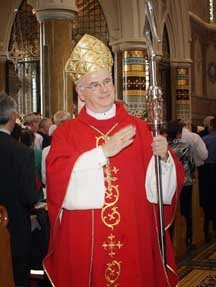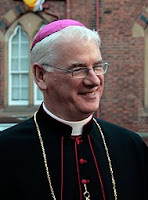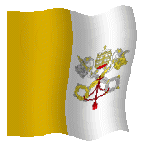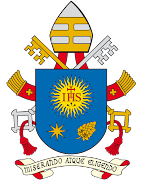Dear Young People,What a delight it is to greet you here at Barangaroo, on the shores of the magnificent Sydney harbour, with its famous bridge and Opera House. Many of you are local, from the outback or the dynamic multicultural communities of Australian cities. Others of you have come from the scattered islands of Oceania, and others still from Asia, the Middle East, Africa and the Americas. Some of you, indeed, have come from as far as I have, Europe! Wherever we are from, we are here at last in Sydney. And together we stand in our world as God’s family, disciples of Christ, empowered by his Spirit to be witnesses of his love and truth for everyone!

I wish firstly to thank the Aboriginal Elders who welcomed me prior to my boarding the boat at Rose Bay. I am deeply moved to stand on your land, knowing the suffering and injustices it has borne, but aware too of the healing and hope that are now at work, rightly bringing pride to all Australian citizens. To the young indigenous - Aboriginal and Torres Strait Islanders - and the Tokelauans, I express my thanks for your stirring welcome. Through you, I send heartfelt greetings to your peoples.
Cardinal Pell and Archbishop Wilson, I thank you for your warm words of welcome. I know that your sentiments resonate in the hearts of the young gathered here this evening, and so I thank you all. Standing before me I see a vibrant image of the universal Church. The variety of nations and cultures from which you hail shows that indeed Christ’s Good News is for everyone; it has reached the ends of the earth. Yet I know too that a good number of you are still seeking a spiritual homeland. Some of you, most welcome among us, are not Catholic or Christian. Others of you perhaps hover at the edge of parish and Church life. To you I wish to offer encouragement: step forward into Christ’s loving embrace; recognize the Church as your home. No one need remain on the outside, for from the day of Pentecost the Church has been one and universal.
This evening I wish also to include those who are not present among us. I am thinking especially of the sick or mentally ill, young people in prison, those struggling on the margins of our societies, and those who for whatever reason feel alienated from the Church. To them I say: Jesus is close to you! Feel his healing embrace, his compassion and mercy!
Almost two thousand years ago, the Apostles, gathered in the upper room together with Mary and some faithful women, were filled with the Holy Spirit (cf. Acts 1:14; 2:4). At that extraordinary moment, which gave birth to the Church, the confusion and fear that had gripped Christ’s disciples were transformed into a vigorous conviction and sense of purpose. They felt impelled to speak of their encounter with the risen Jesus whom they had come to call affectionately, the Lord. In many ways, the Apostles were ordinary. None could claim to be the perfect disciple. They failed to recognize Christ (cf. Lk 24:13-32), felt ashamed of their own ambition (cf. Lk 22:24-27), and had even denied him (cf. Lk 22:54-62). Yet, when empowered by the Holy Spirit, they were transfixed by the truth of Christ’s Gospel and inspired to proclaim it fearlessly. Emboldened, they exclaimed: repent, be baptized, receive the Holy Spirit (cf. Acts 2:37-38)! Grounded in the Apostles’ teaching, in fellowship, and in the breaking of the bread and prayer (cf. Acts 2:42), the young Christian community moved forward to oppose the perversity in the culture around them (cf. Acts 2:40), to care for one another (cf. Acts 2:44-47), to defend their belief in Jesus in the face of hostility (cf Acts 4:33), and to heal the sick (cf. Acts 5:12-16). And in obedience to Christ’s own command, they set forth, bearing witness to the greatest story ever: that God has become one of us, that the divine has entered human history in order to transform it, and that we are called to immerse ourselves in Christ’s saving love which triumphs over evil and death. Saint Paul, in his famous speech to the Areopagus, introduced the message in this way: "God gives everything – including life and breath – to everyone … so that all nations might seek God and, by feeling their way towards him, succeed in finding him. In fact he is not far from any of us, since it is in him that we live and move and have our being" (Acts 17: 25-28).

And ever since, men and women have set out to tell the same story, witnessing to Christ’s truth and love, and contributing to the Church’s mission. Today, we think of those pioneering Priests, Sisters and Brothers who came to these shores, and to other parts of the Pacific, from Ireland, France, Britain and elsewhere in Europe. The great majority were young - some still in their late teens - and when they bade farewell to their parents, brothers and sisters, and friends, they knew they were unlikely ever to return home. Their whole lives were a selfless Christian witness. They became the humble but tenacious builders of so much of the social and spiritual heritage which still today brings goodness, compassion and purpose to these nations. And they went on to inspire another generation. We think immediately of the faith which sustained Blessed Mary MacKillop in her sheer determination to educate especially the poor, and Blessed Peter To Rot in his steadfast resolution that community leadership must always include the Gospel. Think also of your own grandparents and parents, your first teachers in faith. They too have made countless sacrifices of time and energy, out of love for you. Supported by your parish priests and teachers, they have the task, not always easy but greatly satisfying, of guiding you towards all that is good and true, through their own witness - their teaching and living of our Christian faith.
Today, it is my turn. For some of us, it might seem like we have come to the end of the world! For people of your age, however, any flight is an exciting prospect. But for me, this one was somewhat daunting! Yet the views afforded of our planet from the air were truly wondrous. The sparkle of the Mediterranean, the grandeur of the north African desert, the lushness of Asia’s forestation, the vastness of the Pacific Ocean, the horizon upon which the sun rose and set, and the majestic splendour of Australia’s natural beauty which I have been able to enjoy these last couple of days; these all evoke a profound sense of awe. It is as though one catches glimpses of the Genesis creation story - light and darkness, the sun and the moon, the waters, the earth, and living creatures; all of which are "good" in God’s eyes (cf. Gen 1:1 - 2:4). Immersed in such beauty, who could not echo the words of the Psalmist in praise of the Creator: "how majestic is your name in all the earth?" (Ps 8:1).
And there is more – something hardly perceivable from the sky – men and women, made in nothing less than God’s own image and likeness (cf. Gen 1:26). At the heart of the marvel of creation are you and I, the human family "crowned with glory and honour" (Ps 8:5). How astounding! With the Psalmist we whisper: "what is man that you are mindful of him?" (Ps 8:4). And drawn into silence, into a spirit of thanksgiving, into the power of holiness, we ponder.
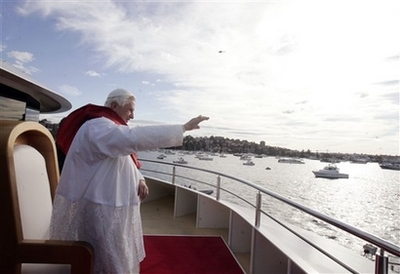
What do we discover? Perhaps reluctantly we come to acknowledge that there are also scars which mark the surface of our earth: erosion, deforestation, the squandering of the world’s mineral and ocean resources in order to fuel an insatiable consumption. Some of you come from island nations whose very existence is threatened by rising water levels; others from nations suffering the effects of devastating drought. God’s wondrous creation is sometimes experienced as almost hostile to its stewards, even something dangerous. How can what is "good" appear so threatening?
And there is more. What of man, the apex of God’s creation? Every day we encounter the genius of human achievement. From advances in medical sciences and the wise application of technology, to the creativity reflected in the arts, the quality and enjoyment of people’s lives in many ways are steadily rising. Among yourselves there is a readiness to take up the plentiful opportunities offered to you. Some of you excel in studies, sport, music, or dance and drama, others of you have a keen sense of social justice and ethics, and many of you take up service and voluntary work. All of us, young and old, have those moments when the innate goodness of the human person - perhaps glimpsed in the gesture of a little child or an adult’s readiness to forgive - fills us with profound joy and gratitude.
Yet such moments do not last. So again, we ponder. And we discover that not only the natural but also the social environment – the habitat we fashion for ourselves – has its scars; wounds indicating that something is amiss. Here too, in our personal lives and in our communities, we can encounter a hostility, something dangerous; a poison which threatens to corrode what is good, reshape who we are, and distort the purpose for which we have been created. Examples abound, as you yourselves know. Among the more prevalent are alcohol and drug abuse, and the exaltation of violence and sexual degradation, often presented through television and the internet as entertainment. I ask myself, could anyone standing face to face with people who actually do suffer violence and sexual exploitation "explain" that these tragedies, portrayed in virtual form, are considered merely "entertainment"?
There is also something sinister which stems from the fact that freedom and tolerance are so often separated from truth. This is fuelled by the notion, widely held today, that there are no absolute truths to guide our lives. Relativism, by indiscriminately giving value to practically everything, has made "experience" all-important. Yet, experiences, detached from any consideration of what is good or true, can lead, not to genuine freedom, but to moral or intellectual confusion, to a lowering of standards, to a loss of self-respect, and even to despair.
Dear friends, life is not governed by chance; it is not random. Your very existence has been willed by God, blessed and given a purpose (cf. Gen 1:28)! Life is not just a succession of events or experiences, helpful though many of them are. It is a search for the true, the good and the beautiful. It is to this end that we make our choices; it is for this that we exercise our freedom; it is in this – in truth, in goodness, and in beauty – that we find happiness and joy. Do not be fooled by those who see you as just another consumer in a market of undifferentiated possibilities, where choice itself becomes the good, novelty usurps beauty, and subjective experience displaces truth.
Christ offers more! Indeed he offers everything! Only he who is the Truth can be the Way and hence also the Life. Thus the "way" which the Apostles brought to the ends of the earth is life in Christ. This is the life of the Church. And the entrance to this life, to the Christian way, is Baptism.

This evening I wish therefore to recall briefly something of our understanding of Baptism before tomorrow considering the Holy Spirit. On the day of your Baptism, God drew you into his holiness (cf. 2 Pet 1:4). You were adopted as a son or daughter of the Father. You were incorporated into Christ. You were made a dwelling place of his Spirit (cf. 1 Cor 6:19). Baptism is neither an achievement, nor a reward. It is a grace; it is God’s work. Indeed, towards the conclusion of your Baptism, the priest turned to your parents and those gathered and, calling you by your name said: "you have become a new creation" (Rite of Baptism, 99).
Dear friends, in your homes, schools and universities, in your places of work and recreation, remember that you are a new creation! Not only do you stand before the Creator in awe, rejoicing at his works, you also realize that the sure foundation of humanity’s solidarity lies in the common origin of every person, the high-point of God’s creative design for the world. As Christians you stand in this world knowing that God has a human face - Jesus Christ - the "way" who satisfies all human yearning, and the "life" to which we are called to bear witness, walking always in his light (cf. ibid., 100).
The task of witness is not easy. There are many today who claim that God should be left on the sidelines, and that religion and faith, while fine for individuals, should either be excluded from the public forum altogether or included only in the pursuit of limited pragmatic goals. This secularist vision seeks to explain human life and shape society with little or no reference to the Creator. It presents itself as neutral, impartial and inclusive of everyone. But in reality, like every ideology, secularism imposes a world-view. If God is irrelevant to public life, then society will be shaped in a godless image, and debate and policy concerning the public good will be driven more by consequences than by principles grounded in truth.
Yet experience shows that turning our back on the Creator’s plan provokes a disorder which has inevitable repercussions on the rest of the created order (cf. 1990 World Day of Peace Message, 5). When God is eclipsed, our ability to recognize the natural order, purpose, and the "good" begins to wane. What was ostensibly promoted as human ingenuity soon manifests itself as folly, greed and selfish exploitation. And so we have become more and more aware of our need for humility before the delicate complexity of God’s world.
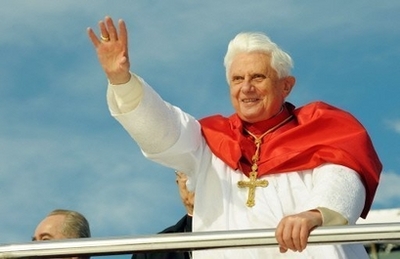
But what of our social environment? Are we equally alert to the signs of turning our back on the moral structure with which God has endowed humanity (cf. 2007 World Day of Peace Message, 8)? Do we recognize that the innate dignity of every individual rests on his or her deepest identity - as image of the Creator - and therefore that human rights are universal, based on the natural law, and not something dependent upon negotiation or patronage, let alone compromise? And so we are led to reflect on what place the poor and the elderly, immigrants and the voiceless, have in our societies. How can it be that domestic violence torments so many mothers and children? How can it be that the most wondrous and sacred human space – the womb – has become a place of unutterable violence?
My dear friends, God’s creation is one and it is good. The concerns for non-violence, sustainable development, justice and peace, and care for our environment are of vital importance for humanity. They cannot, however, be understood apart from a profound reflection upon the innate dignity of every human life from conception to natural death: a dignity conferred by God himself and thus inviolable. Our world has grown weary of greed, exploitation and division, of the tedium of false idols and piecemeal responses, and the pain of false promises. Our hearts and minds are yearning for a vision of life where love endures, where gifts are shared, where unity is built, where freedom finds meaning in truth, and where identity is found in respectful communion. This is the work of the Holy Spirit! This is the hope held out by the Gospel of Jesus Christ. It is to bear witness to this reality that you were created anew at Baptism and strengthened through the gifts of the Spirit at Confirmation. Let this be the message that you bring from Sydney to the world!
 Damian Thompson's Holy Smoke Blog has the following report (pay particular attention to the paragraph in red):
Damian Thompson's Holy Smoke Blog has the following report (pay particular attention to the paragraph in red): 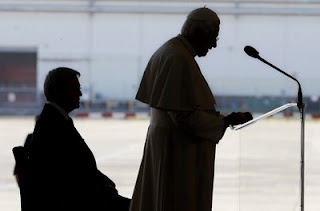
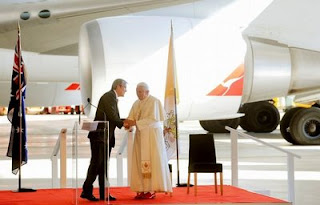
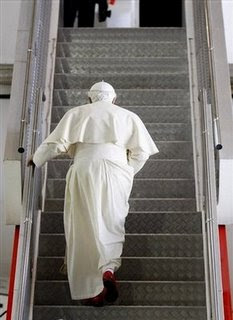

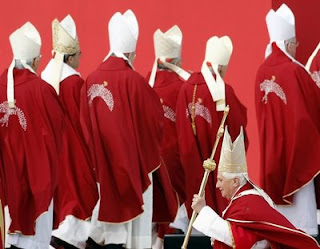 Dear Friends,"You will receive power when the Holy Spirit comes upon you" (Acts 1:8). We have seen this promise fulfilled! On the day of Pentecost, as we heard in the first reading, the Risen Lord, seated at the right hand of the Father, sent the Spirit upon the disciples gathered in the Upper Room. In the power of that Spirit, Peter and the Apostles went forth to preach the Gospel to the ends of the earth. In every age, and in every language, the Church throughout the world continues to proclaim the marvels of God and to call all nations and peoples to faith, hope and new life in Christ.
Dear Friends,"You will receive power when the Holy Spirit comes upon you" (Acts 1:8). We have seen this promise fulfilled! On the day of Pentecost, as we heard in the first reading, the Risen Lord, seated at the right hand of the Father, sent the Spirit upon the disciples gathered in the Upper Room. In the power of that Spirit, Peter and the Apostles went forth to preach the Gospel to the ends of the earth. In every age, and in every language, the Church throughout the world continues to proclaim the marvels of God and to call all nations and peoples to faith, hope and new life in Christ. 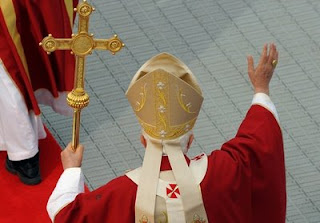 Here in Australia, this "great south land of the Holy Spirit", all of us have had an unforgettable experience of the Spirit's presence and power in the beauty of nature. Our eyes have been opened to see the world around us as it truly is: "charged", as the poet says, "with the grandeur of God", filled with the glory of his creative love. Here too, in this great assembly of young Christians from all over the world, we have had a vivid experience of the Spirit's presence and power in the life of the Church. We have seen the Church for what she truly is: the Body of Christ, a living community of love, embracing people of every race, nation and tongue, of every time and place, in the unity born of our faith in the Risen Lord. The power of the Spirit never ceases to fill the Church with life! Through the grace of the Church's sacraments, that power also flows deep within us, like an underground river which nourishes our spirit and draws us ever nearer to the source of our true life, which is Christ. Saint Ignatius of Antioch, who died a martyr in Rome at the beginning of the second century, has left us a splendid description of the Spirit's power dwelling within us. He spoke of the Spirit as a fountain of living water springing up within his heart and whispering: "Come, come to the Father" (cf. Ad Rom., 6:1-9).
Here in Australia, this "great south land of the Holy Spirit", all of us have had an unforgettable experience of the Spirit's presence and power in the beauty of nature. Our eyes have been opened to see the world around us as it truly is: "charged", as the poet says, "with the grandeur of God", filled with the glory of his creative love. Here too, in this great assembly of young Christians from all over the world, we have had a vivid experience of the Spirit's presence and power in the life of the Church. We have seen the Church for what she truly is: the Body of Christ, a living community of love, embracing people of every race, nation and tongue, of every time and place, in the unity born of our faith in the Risen Lord. The power of the Spirit never ceases to fill the Church with life! Through the grace of the Church's sacraments, that power also flows deep within us, like an underground river which nourishes our spirit and draws us ever nearer to the source of our true life, which is Christ. Saint Ignatius of Antioch, who died a martyr in Rome at the beginning of the second century, has left us a splendid description of the Spirit's power dwelling within us. He spoke of the Spirit as a fountain of living water springing up within his heart and whispering: "Come, come to the Father" (cf. Ad Rom., 6:1-9).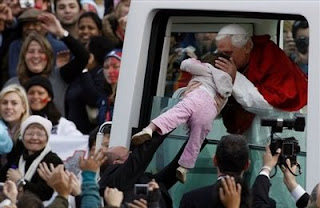 Dear young people, let me now ask you a question. What will you leave to the next generation? Are you building your lives on firm foundations, building something that will endure? Are you living your lives in a way that opens up space for the Spirit in the midst of a world that wants to forget God, or even rejects him in the name of a falsely-conceived freedom? How are you using the gifts you have been given, the "power" which the Holy Spirit is even now prepared to release within you? What legacy will you leave to young people yet to come? What difference will you make? The power of the Holy Spirit does not only enlighten and console us. It also points us to the future, to the coming of God's Kingdom. What a magnificent vision of a humanity redeemed and renewed we see in the new age promised by today's Gospel! Saint Luke tells us that Jesus Christ is the fulfilment of all God's promises, the Messiah who fully possesses the Holy Spirit in order to bestow that gift upon all mankind. The outpouring of Christ's Spirit upon humanity is a pledge of hope and deliverance from everything that impoverishes us. It gives the blind new sight; it sets the downtrodden free, and it creates unity in and through diversity (cf. Lk 4:18-19; Is 61:1-2). This power can create a new world: it can "renew the face of the earth" (cf. Ps 104:30)!
Dear young people, let me now ask you a question. What will you leave to the next generation? Are you building your lives on firm foundations, building something that will endure? Are you living your lives in a way that opens up space for the Spirit in the midst of a world that wants to forget God, or even rejects him in the name of a falsely-conceived freedom? How are you using the gifts you have been given, the "power" which the Holy Spirit is even now prepared to release within you? What legacy will you leave to young people yet to come? What difference will you make? The power of the Holy Spirit does not only enlighten and console us. It also points us to the future, to the coming of God's Kingdom. What a magnificent vision of a humanity redeemed and renewed we see in the new age promised by today's Gospel! Saint Luke tells us that Jesus Christ is the fulfilment of all God's promises, the Messiah who fully possesses the Holy Spirit in order to bestow that gift upon all mankind. The outpouring of Christ's Spirit upon humanity is a pledge of hope and deliverance from everything that impoverishes us. It gives the blind new sight; it sets the downtrodden free, and it creates unity in and through diversity (cf. Lk 4:18-19; Is 61:1-2). This power can create a new world: it can "renew the face of the earth" (cf. Ps 104:30)!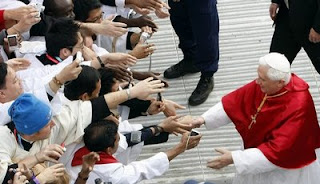 Through the loving intercession of Mary, Mother of the Church, may this Twenty-third World Youth Day be experienced as a new Upper Room, from which all of us, burning with the fire and love of the Holy Spirit, go forth to proclaim the Risen Christ and to draw every heart to him! Amen.
Through the loving intercession of Mary, Mother of the Church, may this Twenty-third World Youth Day be experienced as a new Upper Room, from which all of us, burning with the fire and love of the Holy Spirit, go forth to proclaim the Risen Christ and to draw every heart to him! Amen.







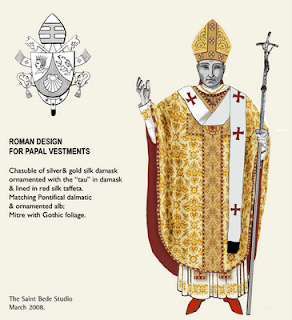
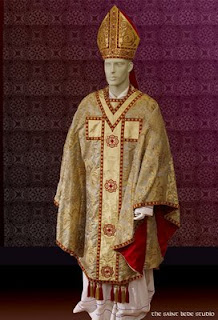
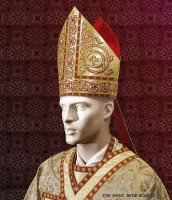
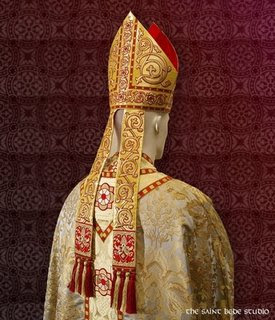
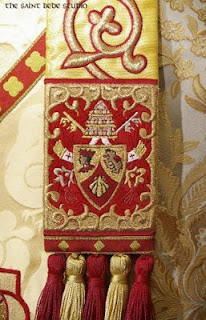 More information can be found at the St Bede Studio Blog
More information can be found at the St Bede Studio Blog 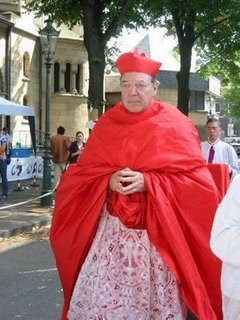 ...no, this dates back to WYD 2005.
...no, this dates back to WYD 2005.
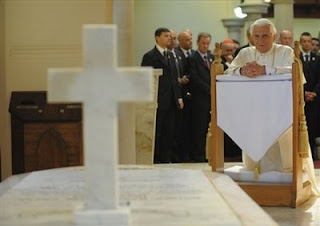
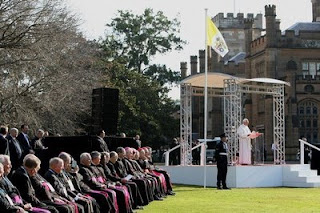
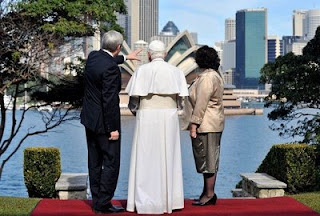
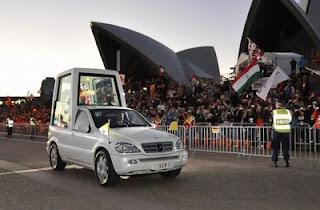
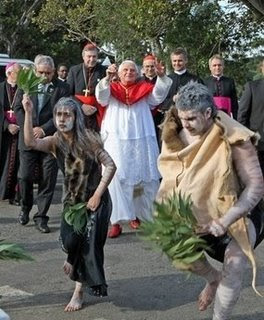
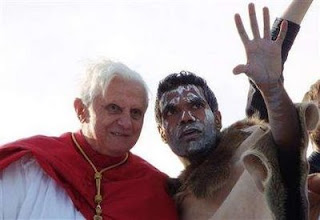
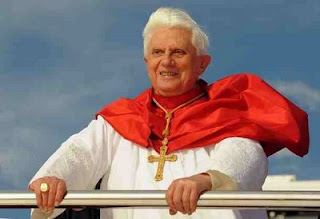
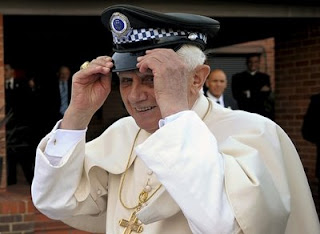
 I wish firstly to thank the Aboriginal Elders who welcomed me prior to my boarding the boat at Rose Bay. I am deeply moved to stand on your land, knowing the suffering and injustices it has borne, but aware too of the healing and hope that are now at work, rightly bringing pride to all Australian citizens. To the young indigenous - Aboriginal and Torres Strait Islanders - and the Tokelauans, I express my thanks for your stirring welcome. Through you, I send heartfelt greetings to your peoples.
I wish firstly to thank the Aboriginal Elders who welcomed me prior to my boarding the boat at Rose Bay. I am deeply moved to stand on your land, knowing the suffering and injustices it has borne, but aware too of the healing and hope that are now at work, rightly bringing pride to all Australian citizens. To the young indigenous - Aboriginal and Torres Strait Islanders - and the Tokelauans, I express my thanks for your stirring welcome. Through you, I send heartfelt greetings to your peoples. And ever since, men and women have set out to tell the same story, witnessing to Christ’s truth and love, and contributing to the Church’s mission. Today, we think of those pioneering Priests, Sisters and Brothers who came to these shores, and to other parts of the Pacific, from Ireland, France, Britain and elsewhere in Europe. The great majority were young - some still in their late teens - and when they bade farewell to their parents, brothers and sisters, and friends, they knew they were unlikely ever to return home. Their whole lives were a selfless Christian witness. They became the humble but tenacious builders of so much of the social and spiritual heritage which still today brings goodness, compassion and purpose to these nations. And they went on to inspire another generation. We think immediately of the faith which sustained Blessed Mary MacKillop in her sheer determination to educate especially the poor, and Blessed Peter To Rot in his steadfast resolution that community leadership must always include the Gospel. Think also of your own grandparents and parents, your first teachers in faith. They too have made countless sacrifices of time and energy, out of love for you. Supported by your parish priests and teachers, they have the task, not always easy but greatly satisfying, of guiding you towards all that is good and true, through their own witness - their teaching and living of our Christian faith.
And ever since, men and women have set out to tell the same story, witnessing to Christ’s truth and love, and contributing to the Church’s mission. Today, we think of those pioneering Priests, Sisters and Brothers who came to these shores, and to other parts of the Pacific, from Ireland, France, Britain and elsewhere in Europe. The great majority were young - some still in their late teens - and when they bade farewell to their parents, brothers and sisters, and friends, they knew they were unlikely ever to return home. Their whole lives were a selfless Christian witness. They became the humble but tenacious builders of so much of the social and spiritual heritage which still today brings goodness, compassion and purpose to these nations. And they went on to inspire another generation. We think immediately of the faith which sustained Blessed Mary MacKillop in her sheer determination to educate especially the poor, and Blessed Peter To Rot in his steadfast resolution that community leadership must always include the Gospel. Think also of your own grandparents and parents, your first teachers in faith. They too have made countless sacrifices of time and energy, out of love for you. Supported by your parish priests and teachers, they have the task, not always easy but greatly satisfying, of guiding you towards all that is good and true, through their own witness - their teaching and living of our Christian faith. What do we discover? Perhaps reluctantly we come to acknowledge that there are also scars which mark the surface of our earth: erosion, deforestation, the squandering of the world’s mineral and ocean resources in order to fuel an insatiable consumption. Some of you come from island nations whose very existence is threatened by rising water levels; others from nations suffering the effects of devastating drought. God’s wondrous creation is sometimes experienced as almost hostile to its stewards, even something dangerous. How can what is "good" appear so threatening?
What do we discover? Perhaps reluctantly we come to acknowledge that there are also scars which mark the surface of our earth: erosion, deforestation, the squandering of the world’s mineral and ocean resources in order to fuel an insatiable consumption. Some of you come from island nations whose very existence is threatened by rising water levels; others from nations suffering the effects of devastating drought. God’s wondrous creation is sometimes experienced as almost hostile to its stewards, even something dangerous. How can what is "good" appear so threatening?
 But what of our social environment? Are we equally alert to the signs of turning our back on the moral structure with which God has endowed humanity (cf. 2007 World Day of Peace Message, 8)? Do we recognize that the innate dignity of every individual rests on his or her deepest identity - as image of the Creator - and therefore that human rights are universal, based on the natural law, and not something dependent upon negotiation or patronage, let alone compromise? And so we are led to reflect on what place the poor and the elderly, immigrants and the voiceless, have in our societies. How can it be that domestic violence torments so many mothers and children? How can it be that the most wondrous and sacred human space – the womb – has become a place of unutterable violence?
But what of our social environment? Are we equally alert to the signs of turning our back on the moral structure with which God has endowed humanity (cf. 2007 World Day of Peace Message, 8)? Do we recognize that the innate dignity of every individual rests on his or her deepest identity - as image of the Creator - and therefore that human rights are universal, based on the natural law, and not something dependent upon negotiation or patronage, let alone compromise? And so we are led to reflect on what place the poor and the elderly, immigrants and the voiceless, have in our societies. How can it be that domestic violence torments so many mothers and children? How can it be that the most wondrous and sacred human space – the womb – has become a place of unutterable violence?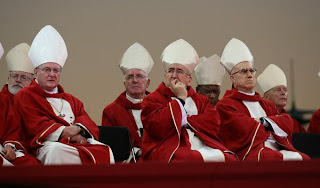
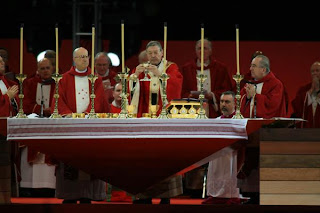
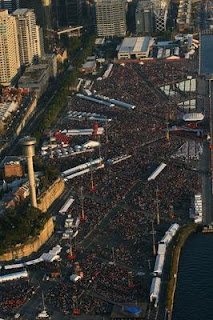
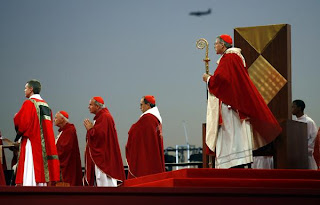

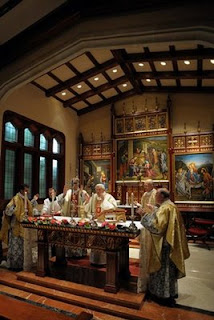
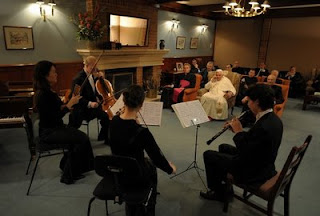
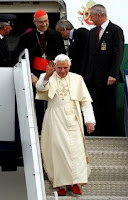
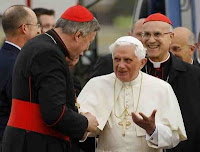
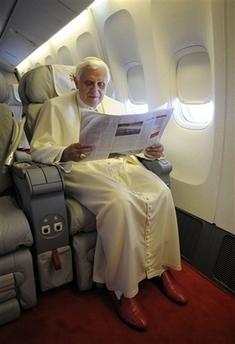 Pope Benedict XVI reads a copy of L’Osservatore Romano on the flight from Rome to Sydney, Saturday, July 12, 2008.
Pope Benedict XVI reads a copy of L’Osservatore Romano on the flight from Rome to Sydney, Saturday, July 12, 2008.